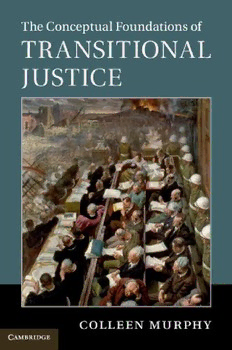
The Conceptual Foundations of Transitional Justice PDF
Preview The Conceptual Foundations of Transitional Justice
THE CONCEPTUAL FOUNDATIONS OF TRANSITIONAL JUSTICE Manycountrieshaveattemptedtotransitiontodemocracyfollowing conflict or repression, but the basic meaning of transitional justice remains hotly contested. In this book, Colleen Murphy analyzes transitionaljustice–showinghowitisdistinguishedfromretributive, corrective,anddistributivejustice–andoutlinestheethicalstandards that societies attempting to democratize should follow. She argues thattransitionaljusticeinvolvesthejustpursuitofsocietaltransform- ation.Suchtransformationrequirespoliticalreconciliation,whichin turn has a complex set of institutional and interpersonal require- ments, including the rule of law. She shows howsocietal transform- ation is also influenced by the moral claims of victims and the demandsofperpetrators,andhowjusticeprocessescanfailtobejust byfailingtofosterthistransformationorbynottreatingvictimsand perpetrators fairly. Her book will be accessible and enlightening for philosophers, political and social scientists, policy analysts, and legal and human rights scholars and activists. colleen murphy is Professor of Law, Philosophy, and Political ScienceattheUniversityofIllinoisatUrbana-Champaign.Sheisthe author of A Moral Theory of Political Reconciliation (Cambridge University Press, 2010), and the coeditor of Engineering Ethics for a GlobalizedWorld(2015),RiskAnalysisofNaturalHazards(2015),and ClimateChangeandItsImpacts:RisksandInequalities(forthcoming). THE CONCEPTUAL FOUNDATIONS OF TRANSITIONAL JUSTICE COLLEEN MURPHY UniversityofIllinoisatUrbana-Champaign UniversityPrintingHouse,Cambridgecb28bs,UnitedKingdom OneLibertyPlaza,20thFloor,NewYork,ny10006,USA 477WilliamstownRoad,PortMelbourne,vic3207,Australia 4843/24,2ndFloor,AnsariRoad,Daryaganj,Delhi–110002,India 79AnsonRoad,#06–04/06,Singapore079906 CambridgeUniversityPressispartoftheUniversityofCambridge. ItfurtherstheUniversity’smissionbydisseminatingknowledgeinthepursuitof education,learning,andresearchatthehighestinternationallevelsofexcellence. www.cambridge.org Informationonthistitle:www.cambridge.org/9781107085473 doi:10.1017/9781316084229 ©ColleenMurphy2017 Thispublicationisincopyright.Subjecttostatutoryexception andtotheprovisionsofrelevantcollectivelicensingagreements, noreproductionofanypartmaytakeplacewithoutthewritten permissionofCambridgeUniversityPress. Firstpublished2017 PrintedintheUnitedKingdombyClays,StIvesplc AcataloguerecordforthispublicationisavailablefromtheBritishLibrary. LibraryofCongressCataloging-in-PublicationData names:Murphy,Colleen,1974-author. title:Theconceptualfoundationsoftransitionaljustice/ColleenMurphy, UniversityofIllinoisatUrbana-Champaign. description:Cambridge,UnitedKingdom;NewYork,NY,USA: CambridgeUniversityPress,2017.|Includesbibliographicalreferencesandindex. identifiers:lccn2016054369|isbn9781107085473(hardback:alk.paper) subjects:lcsh:Transitionaljustice–Philosophy. classification:lccK5250.M872017|ddc340/.115–dc23LCrecord availableathttps://lccn.loc.gov/2016054369 isbn978-1-107-08547-3Hardback CambridgeUniversityPresshasnoresponsibilityforthepersistenceoraccuracy ofURLsforexternalorthird-partyInternetWebsitesreferredtointhispublication anddoesnotguaranteethatanycontentonsuchWebsitesis,orwillremain, accurateorappropriate. Contents Preface and Acknowledgments page vii Introduction 1 1 Circumstances of Transitional Justice 38 2 The Problem of Transitional Justice 83 3 Societal Transformation 119 4 The Just Pursuit of Transformation 160 Conclusion 193 Works Cited 202 Index 218 v Preface and Acknowledgments Dealingwithpastwrongdoingisaprominentandrecurringissueformany societies.TheUnitedStatescontinuestostrugglewithitslegacyofslavery and Jim Crow–era segregation as well as ongoing tensions between the policeandblacksheightenedbyrecentpoliceshootings.Canadacontinues to deal with the legacy of its residential schools for indigenous peoples. Discussions about how, whether, and in what way Spain should face the abusesfromtheFrancoera,andNorthernIrelandshouldfacethelegacyof The Troubles are ongoing. At the time of writing, the brutal civil war in Syria continues into its fifth year, amid calls to establish processes to deal withrightsabusescommittedtodate.TheworkoftheTunisianTruthand DignityCommissiontodealwithgrosshumanrightsviolationsduringthe periodofrepressionstartinginJuly1,1955,andpriortothe2011revolution is ongoing, as is Nepal’s Truth and Reconciliation Commission and National Commission of Inquiry into Disappearances focusing on gross human rights violations committed during armed conflict from 1996 to 2006. The Supreme Court of El Salvador just invalidated a 1993 amnesty law covering atrocities committed by government forces and guerillas during its twelve-year civil war (1980–1992). The International Criminal Court currently has ten situations under investigation, including in Georgia, the Central African Republic, Mali, and Uganda, as well as ongoing trials in the Ongwen, Banda, Ntaganda, Bemba et al., Gbagbo and Blé Goudé, and Al Mahdi cases. The moral questions raised in these cases are similar in some morally salientrespects, butnotidentical.One of theprimaryaimsof thisbookis to clarify these similarities and differences. While past wrongs place moral demandsonparticularperpetratorsandgeneratemoralclaimsofparticular victims, the appropriate satisfaction of these claims is context dependent. What it means to properly acknowledge wrongdoing depends on who is doing the acknowledgment and the particular kind of wrong being acknowledged. Moreover, the overarching moral point and purpose of vii viii Preface and Acknowledgments respondingtopastwrongsisinimportantrespectsalsocontextdependent. In some cases, the overarching moral point is fostering societal transform- ation. In other contexts, societal transformation may not be necessary to pursue, and the main moral point in dealing with past wrongs may be simply to respond justly to perpetrators and victims of wrongdoing. The moral point and purpose in dealing with past wrongs in turn shapes the moral standards a response to wrongdoing must satisfy in order to qualify as just. Over the course of my book, I discuss the various moral aims that dealing with past wrongs might have and the corresponding standards of justice such aims require be satisfied. This book has taken seven years to write, and over the course of that period of time many individuals and audiences provided invaluable feed- back. I am particularly grateful to the Princeton University Center for Human Values (UCHV) for the time and support provided through my Laurance S. Rockefeller Visiting Faculty Fellowship during the 2010–2011 academic year. My project on transitional justice was in its very early stages, and conversations and presentations throughout the year were critical in shaping the direction it ultimately took. I am especially grateful to Chuck Beitz, Corey Brettschneider, Tom Christiano, Alex Guerrero, Liz Harman, Adrienne Martin, Alan Patton, Jon Quong, Kim Lane Scheppele, and Peter Singer for the feedback they provided. Chuck also deserves special mention not only for his intellectual feedback but also for thesupportheprovidedinhiscapacityasdirectoroftheUCHV.Myfirst sonwasborninJanuaryoftheyearIspentattheUCHV,andIwasableto remain engaged with the center because of the way in which Chuck encouraged and welcomed me to bring my son with me to my office as well as UCHV talks and events. IalsopresenteddifferentpartsofthisbookatIllinoisWesleyanUniversity; the Midwest Political Science Association; the Department of Philosophy andtheMershonCenteratTheOhioStateUniversity;OsgoodeHallLaw School at York University; the Law and Philosophy Program at the University of Texas at Austin; the Comparative Politics Workshop and theCollegeofLawattheUniversityofIllinoisatUrbana-Champaign;the S.J.QuinneyCollegeofLawandTannerCenterforHumanRightsatthe University of Utah; the University of Virginia’s Institute for Practical Ethics and Public Life and the Program in Political Philosophy, Policy, and Law (PPL); the Robina Institute on Criminal Law and Criminal Justice at the University of Minnesota Law School; the Department of Philosophy at Illinois State University; Queen’s University Belfast; the University of South Florida; and the Society for Applied Philosophy.
